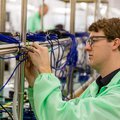 I'm curious, how are the filters in the FilterBox implemented in hardware? Do you switch LC elements in and out with relays or analog switches?
I'm curious, how are the filters in the FilterBox implemented in hardware? Do you switch LC elements in and out with relays or analog switches?
 @RichardCollins there's no doubt that we're at the start of a push for SDI in education, it's not well established. Bleeding edge is a bit strong IMO but when labs have been using the same scopes and power supplies, with different screens and button layouts only, for 20++ years, sure there's a change to the pedagogy required to support this tech. But I think it's worth it, I'm not alone, but I'm also not without opposition :-)
@RichardCollins there's no doubt that we're at the start of a push for SDI in education, it's not well established. Bleeding edge is a bit strong IMO but when labs have been using the same scopes and power supplies, with different screens and button layouts only, for 20++ years, sure there's a change to the pedagogy required to support this tech. But I think it's worth it, I'm not alone, but I'm also not without opposition :-)
 Man -- if someone could write their own firmware for that, my hat would be off to them. I stare at FPGAs like they're ouija boards :)
Man -- if someone could write their own firmware for that, my hat would be off to them. I stare at FPGAs like they're ouija boards :)
 @Myself We're launching an open access FPGA model for Go in June, it's already available for Moku:Pro. Called Moku Cloud Compile it does require that you send your HDL to our servers to be built so we can optimise it for our driver framework
@Myself We're launching an open access FPGA model for Go in June, it's already available for Moku:Pro. Called Moku Cloud Compile it does require that you send your HDL to our servers to be built so we can optimise it for our driver framework
 Man you guys are brave.
Man you guys are brave.
 @Dan Maloney All DSP my friend! You can load in FIR or IIR coefficients, or simply drag lines around on a bode plot until you like the look of the transfer function and it all updates on the device in real time
@Dan Maloney All DSP my friend! You can load in FIR or IIR coefficients, or simply drag lines around on a bode plot until you like the look of the transfer function and it all updates on the device in real time
 "Wizardry" was going to be my other suggestion...
"Wizardry" was going to be my other suggestion...
 Definitely "Wizardry"
Definitely "Wizardry"
 Yep that's closer. Our DSP and FPGA folk mostly come from a high precision metrology background, they're mostly PhDs, and they are absolutely wizards
Yep that's closer. Our DSP and FPGA folk mostly come from a high precision metrology background, they're mostly PhDs, and they are absolutely wizards
 The hardware is changing so fast now. I was reading about 100 Gsps devices. And the prices drop then rise, drop then rise. If someone buys your box today, it will be obsolete in 6 months. No amount of software will change a 10 Msps ADC into a 100 Gsps one. And DATA is the key to any application but you are just putting tiny snips on the screen and letting student play around. All the real problem now use massive machine learning and that means stored and accessible data, open and shared algorithm development, and global sharing over years or decades. 50 million variations for what you can do with a box is not as useful as a few hundred where the student masters it, and applies to real problems - in a community of peers and potential employers and collaborators.
The hardware is changing so fast now. I was reading about 100 Gsps devices. And the prices drop then rise, drop then rise. If someone buys your box today, it will be obsolete in 6 months. No amount of software will change a 10 Msps ADC into a 100 Gsps one. And DATA is the key to any application but you are just putting tiny snips on the screen and letting student play around. All the real problem now use massive machine learning and that means stored and accessible data, open and shared algorithm development, and global sharing over years or decades. 50 million variations for what you can do with a box is not as useful as a few hundred where the student masters it, and applies to real problems - in a community of peers and potential employers and collaborators.
 I was actually surprised, amazed and excited that I could design a bandpass filter with around 10kHz width on a 1MHz carrier in order to view an AM radio station in isolation in the time domain, then drag the band over to the next station etc. Very cool
I was actually surprised, amazed and excited that I could design a bandpass filter with around 10kHz width on a 1MHz carrier in order to view an AM radio station in isolation in the time domain, then drag the band over to the next station etc. Very cool
 So, last week I was doing a little work in a power supply that was made in 1967, the company is long gone but the schematics are available, the parts are commodity, and power supplies are universally useful. How much of this instrumentation will be working and maintainable in 50 years; where do I go for a cloud compiler in 2078?
So, last week I was doing a little work in a power supply that was made in 1967, the company is long gone but the schematics are available, the parts are commodity, and power supplies are universally useful. How much of this instrumentation will be working and maintainable in 50 years; where do I go for a cloud compiler in 2078?
 Are you seriously asking him to predict 55 years in the future?
Are you seriously asking him to predict 55 years in the future?
 @RichardCollins If you need more than 30MHz bandwidth then fair play to you sir. Again if we take the education space, they haven't done anything outside of this capability for 20 years and may not for the next 10+, excepting RF and IoT. And yep that's important, no denying, but we can still cover all but one or two courses in a full EE degree. But I get your point, DSP and SDI is awesome but you do occasionally need to buy new things! Just with SDI, you don't need to buy them as often (probably)
@RichardCollins If you need more than 30MHz bandwidth then fair play to you sir. Again if we take the education space, they haven't done anything outside of this capability for 20 years and may not for the next 10+, excepting RF and IoT. And yep that's important, no denying, but we can still cover all but one or two courses in a full EE degree. But I get your point, DSP and SDI is awesome but you do occasionally need to buy new things! Just with SDI, you don't need to buy them as often (probably)
 I'm asking whether the closed nature of the compiler might ever change.
I'm asking whether the closed nature of the compiler might ever change.
 In 55 years time?
In 55 years time?
 Yes.
Yes.
 Yes it will.
Yes it will.
 But a power supply is an entirely different beast than a spectrum analyzer, right? And how many SAs or oscilloscopes made in the 1960s are still relevant today?
But a power supply is an entirely different beast than a spectrum analyzer, right? And how many SAs or oscilloscopes made in the 1960s are still relevant today?
 @Myself Yeah for sure, we're actually working with Xilinx to get some extra features that would allow people to do the builds, including our proprietary steps, on their own machines too. Sure obsolescence is a problem, but a more immediate one is simply data sovereignty and we definitely need to deal with this
@Myself Yeah for sure, we're actually working with Xilinx to get some extra features that would allow people to do the builds, including our proprietary steps, on their own machines too. Sure obsolescence is a problem, but a more immediate one is simply data sovereignty and we definitely need to deal with this
 common issue to all cloud services, we're certainly not immune
common issue to all cloud services, we're certainly not immune
 Yeah.
Yeah.
![]() Let me introduce you to my Tektronix 475, along with the other three scopes I own ...
Let me introduce you to my Tektronix 475, along with the other three scopes I own ...
 The other side of the coin is again simplicity though, and I don't know when the last time was any of you spooled up a new Xilinx Vivado install, but 20GB of downloads and a day or two later you can do the first build that would have taken you literally 3 minutes on MCC
The other side of the coin is again simplicity though, and I don't know when the last time was any of you spooled up a new Xilinx Vivado install, but 20GB of downloads and a day or two later you can do the first build that would have taken you literally 3 minutes on MCC
 Yeah, I've got an old Tek too, but my Keysight DSO is far more useful as a daily driver.
Yeah, I've got an old Tek too, but my Keysight DSO is far more useful as a daily driver.
 Yup.
Yup.
 I use my Keysight more often than my Tek too.
I use my Keysight more often than my Tek too.
![]() And there is crying in Beaverton, tonight ...
And there is crying in Beaverton, tonight ...
![]() I admit I use my newer scopes more often, but then I restore vintage radios and computers also.
I admit I use my newer scopes more often, but then I restore vintage radios and computers also.
 Something else to consider (re: 100Gsps links) -- you're not even really using scope probes at that point. You've got an impedance matched connection all the way down the signal path (If you're even able to tap the signal path -- I don't know that you are)
Something else to consider (re: 100Gsps links) -- you're not even really using scope probes at that point. You've got an impedance matched connection all the way down the signal path (If you're even able to tap the signal path -- I don't know that you are)
 I have an HP oscilloscope running on lamps so...
I have an HP oscilloscope running on lamps so...
 Ah--my Tek has some hours on it, and it starts misbehaving if I have it on for too long.
Ah--my Tek has some hours on it, and it starts misbehaving if I have it on for too long.
 It's not a matter of the Keysight scope being a better instrument, it's a matter of it being newer and far more reliable.
It's not a matter of the Keysight scope being a better instrument, it's a matter of it being newer and far more reliable.
 Yeah right back at the head of this chat we talked about SDI tradeoffs and the single frontend doing everything; a 100GSa/s frontend will be quite specialised and bespoke for a while yet
Yeah right back at the head of this chat we talked about SDI tradeoffs and the single frontend doing everything; a 100GSa/s frontend will be quite specialised and bespoke for a while yet
 I missed that.
I missed that.
 I'm a slacker
I'm a slacker
 And the sun is probably up by now in Canberra, too. So it's probably time to let Ben get the rest of his day going. Thanks very much for getting up so early to hang with us Ben, I really appreciate it. And thanks to all for the great discussion.
And the sun is probably up by now in Canberra, too. So it's probably time to let Ben get the rest of his day going. Thanks very much for getting up so early to hang with us Ben, I really appreciate it. And thanks to all for the great discussion.
 No worries @Dan Maloney , thanks everyone! If you have any other questions, please reach out to me by DM here or ben.nizette@liquidinstruments.com
No worries @Dan Maloney , thanks everyone! If you have any other questions, please reach out to me by DM here or ben.nizette@liquidinstruments.com
 Thanks Ben & Dan!
Thanks Ben & Dan!
 And a tip o' the hat to Mark for suggesting this chat!
And a tip o' the hat to Mark for suggesting this chat!
 Thanks @Ben Nizette , it was really interesting
Thanks @Ben Nizette , it was really interesting
 I enjoyed it a lot, time for another ☕
I enjoyed it a lot, time for another ☕
![]() So, another question to ponder, what instruments can you make by concatenating simpler instruments>
So, another question to ponder, what instruments can you make by concatenating simpler instruments>
![]() That is, you don't need a TDR if you have a signal source, a spectrum analyzer and a way to collect data.
That is, you don't need a TDR if you have a signal source, a spectrum analyzer and a way to collect data.
 @Ben Nizette I mostly work with gravitational signals, but they are buried deep in with many terrestrial and human noise sources. To separate them requires working with roughly the range from microHertz to TeraHertz. 30 Msps is not bad, it just needs to be very flexible. The algorithms are heaving on data, so working with 24 hours or 30 days of data at a time is common. I am working on a problem imaging a region of the sun. The correlations require working with thousands of images, the models that underly them, and then doing the time of flight gravitational array. General purpose tools for students probably can't do that yet. but every groups doing research has to try to hack together a way. If you teach "Just throw a bunch of components in a box and add software. if it doesn't work try something else" That kind of teaches a sloppy way to do research. Would I want to hire those guys or someone who knows how to plan and execute toward clear objectives. And, as I see on Hackaday.io, there are a lot of research and experiment things that dovetail now into short run manufacturing and potential startups. Shoot from the hip or fancy handwaving on a box might not be the best thing to teach. Just saying.
@Ben Nizette I mostly work with gravitational signals, but they are buried deep in with many terrestrial and human noise sources. To separate them requires working with roughly the range from microHertz to TeraHertz. 30 Msps is not bad, it just needs to be very flexible. The algorithms are heaving on data, so working with 24 hours or 30 days of data at a time is common. I am working on a problem imaging a region of the sun. The correlations require working with thousands of images, the models that underly them, and then doing the time of flight gravitational array. General purpose tools for students probably can't do that yet. but every groups doing research has to try to hack together a way. If you teach "Just throw a bunch of components in a box and add software. if it doesn't work try something else" That kind of teaches a sloppy way to do research. Would I want to hire those guys or someone who knows how to plan and execute toward clear objectives. And, as I see on Hackaday.io, there are a lot of research and experiment things that dovetail now into short run manufacturing and potential startups. Shoot from the hip or fancy handwaving on a box might not be the best thing to teach. Just saying.
 @Randy Yes! We didn't get to it just now, but our "Multi-Instrument Mode" feature is coming to Go in June which allows concatenating between 2-4 instruments inside the FPGA. The other day I build a PLL using the lock-in amplifier and wavegen etc. https://www.liquidinstruments.com/multi-instrument-mode/
@Randy Yes! We didn't get to it just now, but our "Multi-Instrument Mode" feature is coming to Go in June which allows concatenating between 2-4 instruments inside the FPGA. The other day I build a PLL using the lock-in amplifier and wavegen etc. https://www.liquidinstruments.com/multi-instrument-mode/
 A few years back there was talk about something called either Inferno or Verilator, as I recall - where you could take System C and convert it to Verilog or vice versa. Is there any kind of support for that sort of thing on your FPGA solution, let's say if I have custom code for dynamic generation of polyphase filter trees - where I am currently n the process of developing my own Pascal/Lazarus compiler for Parallax propeller P2, etc.
A few years back there was talk about something called either Inferno or Verilator, as I recall - where you could take System C and convert it to Verilog or vice versa. Is there any kind of support for that sort of thing on your FPGA solution, let's say if I have custom code for dynamic generation of polyphase filter trees - where I am currently n the process of developing my own Pascal/Lazarus compiler for Parallax propeller P2, etc.
![]() Got to order one of these things when I get back home.
Got to order one of these things when I get back home.
 Dan Maloney
Dan Maloney
Discussions
Become a Hackaday.io Member
Create an account to leave a comment. Already have an account? Log In.